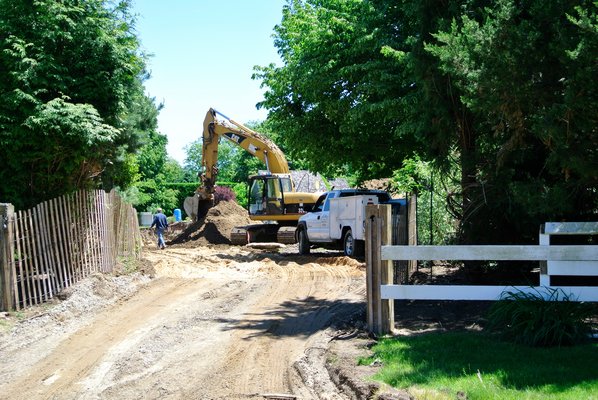
Sagaponack will be the latest municipality to take up the debate of whether the peaceful enjoyment of one’s property outweighs the creation of such property for others, when it holds a public meeting this Saturday morning to discuss the suggestion of banning construction work in the village on Saturdays in summer.
Most small villages on the South Fork, Sagaponack included, have some restrictions that shorten the allowable time for construction work on Saturdays and bar it entirely on Sundays. But Sagaponack would be the first to ban construction entirely on Saturdays as well, if it follows the suggestion that some of its residents have made to the Village Board.
The board has asked residents and businesspeople to share their views n at Sagaponack Village Hall on Saturday, June 14, at 9 a.m.
“This is purely an informational meeting, there is no proposed ordinance at this point—but we decided to let the public weigh in on it,” Village Mayor Don Louchheim said this week. “I suspect it will be a well attended meeting. It seems to be heavily favored by second-home owners.”
Sagaponack currently limits construction to 7 a.m. to 3 p.m. on Saturdays, year round, and from 7 a.m. to 7 p.m. during the week. Construction is prohibited on Sundays. The limits apply only to commercial construction companies. Homeowners doing work on their own houses are not limited. At recent Village Board meetings, residents suggested that the restriction be tightened to prohibit commercial construction work on Saturdays during the traditional Memorial Day to Labor Day summer season—approximately 12 days.
With the duration of some gargantuan construction projects in the affluent village stretching over several seasons, or even several years, the burden on neighbors, residents have said, is not always minor. Losing a dozen days of work a year on a two- or three-year project should not unduly encumber builders, they have also noted.
Builders have been largely silent. Calls seeking comment placed to several construction companies working on projects in the village were not returned.
Anecdotally, Saturday construction work does not appear to be a widespread practice. The mayor said that during a personal tour of the village, he counted 47 properties or homes undergoing some form of construction work and that only six had workers at them on a recent Saturday.
Village Building Inspector John Woudsma said that a Saturday ban would likely not be a great imposition on most builders, but that those with deadlines looming might feel otherwise. He said he has not heard any specific objections..
In other municipalities, restrictions have been met with a mixture of apathy and outrage. Contractors and tradespeople came out in droves at East Hampton Village meetings earlier this spring to protest the proposal of tightening restrictions on weekend construction and landscaping work, though banning it outright was never proposed. The Village Board rolled back its proposal before adopting rules that are similar to what Sagaponack now has on its books.
“We sympathize with the residents who want to be able to have a quiet afternoon barbecue in their backyard, but also with our residents who are in construction,” East Hampton Village Trustee Barbara Borsack said. “Builders have a lot of demands put on them and we don’t want to put them out of business, and those of us who go to work all week, when else are we going to do that kind of work? It’s a tough balance.”
The balance in Sagaponack may lean more toward the homeowners seeking solace from the banging of nails and grumble of heavy equipment. Mayor Louchheim estimated that at least two-thirds of properties in the village are second homes, yet , the year-round residents hark back to the village’s agrarian roots and blanch at the creeping evolution to a resort for the super-rich.
“The farmers work on Saturday, the merchants work on Saturday and for a local person Saturday isn’t necessarily a day of leisure,” he said. “It seems to some that this kind of thing is almost an admission that we are no longer the Sagaponack that was but that we are something new. That we are now just a second-home community and are throwing in the towel.”